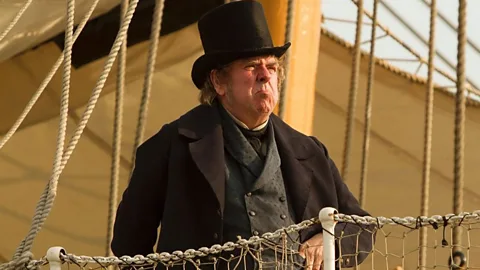Mr Turner: Cannes 2014 review

British director Mike Leigh’s latest film, a portrait of the Victorian painter JWM Turner, is “rich, comionate and frequently funny”, writes Nicholas Barber.
JMW Turner, the great Victorian painter of landscapes and seascapes, had his cinematic standing boosted recently when James Bond and Q discussed one of his paintings, The Fighting Temeraire, in Skyfall. Now, in Mike Leigh’s rich, comionate and frequently funny new drama about the artist, we get to see the moment when Turner (Timothy Spall) has the idea for the painting: there he is, sitting in a rowing boat on the Thames estuary, watching a tug boat pulling the distinguished warship towards him as the sun sets. The question the scene raises is which of the two vessels represents Turner. Is he the grand old ship whose time has ed, or the smoke-belching boat which is chugging its way into the future? Perhaps he’s both.
It’s quite a risk for any film to recreate the setting of such an illustrious oil painting but Dick Pope, Leigh’s cinematographer, gives Turner a run for his money. Right from the opening shot, Mr Turner is a consistently exquisite collection of screen-filling vistas, many of them shot in the pale, late-afternoon sunshine. They’d merit a place on any gallery wall.
Turner’s behaviour is nowhere near so attractive. Early in the film, Leigh establishes that he barely acknowledges the existence of his grown-up daughters (Ruth Sheen has a coruscating cameo as his perpetually furious wife), and he doesn’t pay much more attention to his stooped, adoring housekeeper. He’ll use her for some quick rutting against a bookcase, but he won’t say a word to her before or after the deed is done.
Why is he being so cruel? Anyone hoping for answers will soon find that Mr Turner doesn’t have any to offer. It sketches two of the artist’s key relationships. In the first half of the film, there’s the touching friendship with “Daddy” (Paul Jesson), his proud father, tireless studio assistant and crafty sales agent. In the second half, there’s a sweetly cosy romance with a widowed Margate landlady (Marion Bailey). But Turner never articulates what the relationships mean to him. The film avoids conventional narrative arcs, so there are no obstacles to overcome or victories to celebrate. Instead, it asks viewers to fill in the gaps and make our own judgements as we watch Turner going about his day-to-day business: chatting to patrons, fending off visitors, mumbling lectures and painting with gusto. (Spitting on the canvas is a favourite technique.) Luckily, Leigh and Spall’s Turner is never less than fascinating.
He’s a charmingly charmless man. Half the time he talks in grunts, growls, snorts and gargles. The other half he delights in cockney slang and mythological allusions. He won’t waste his breath on people who don’t interest him, but he can also be a hearty, backslapping cove who whirls through the Royal Academy like a top-hatted typhoon, flinging out advice to his peers, whether they want it or not: only Constable (James Fleet) gets the cold shoulder. For all of his eccentricity and insensitivity, Mr Turner depicts the artist as a vibrant, unpretentious and lovable individual. True, the film makes Spall look even more like an animal than he did when he played a were-rat in the Harry Potter series, but he is enormously engaging in the role of a lifetime. Expect him to receive awards galore - and expect newspaper headlines galore with puns about the Turner Prize.
As for Leigh, it’s clear what he thinks of critics: John Ruskin (Joshua McGuire), one of Turner’s most influential ers, is caricatured as a foppish narcissist whose highfalutin, speech-impedimented pronouncements on “bwushstwokes” are parried by the artist’s dismissive grunts. But that won’t stop critics trumpeting Mr Turner as one of Leigh’s most rewarding works. He is now 71, but this film and his last one, Another Year, show that he’s at the lofty peak of his powers. Would it be too much to hope that he’ll direct a Bond movie next?
★★★★☆
